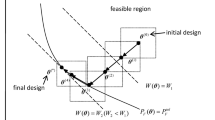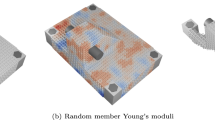Abstract
This paper presents an efficient computational method for optimal structural design in the presence of uncertain Young’s modulus modeled using discretized random fields. To quantify and propagate the uncertainty, random matrix theory is employed to quantify uncertainty in the context of robust topology optimization (RTO) for the minimization of compliance. Random matrix theory employs statistical inference methods to model the matrix-variate probability distribution of the finite element stiffness matrix. This provides analytical expressions for the mean and the standard deviation of the compliance, a combination of which is minimized in RTO. The novel random matrix theory-based RTO is computationally efficient due to the intrusive nature of the method, and is flexible as its computational performance and robustness remain consistent regardless of the correlation lengths or the variance of the random field, as demonstrated through numerical cases. The random matrix RTO method is applied to several two-dimensional numerical problems where the random fields of the modulus are assigned with ranges of correlation lengths and variances to illustrate the versatility of the method. The performance of random matrix RTO is compared with Monte Carlo RTO and stochastic collocation RTO to explore the efficiency and accuracy of the method.








Similar content being viewed by others
Notes
In this paper, both the computational time per iteration and the total time are used as metrics for efficiency. The total time shows whether random matrix RTO provides a significant speed up in the overall optimization, while the time per iteration provides a consistent ratio of speed up when comparing amongst the algorithms.
References
Adhikari S (2007a) Matrix variate distributions for probabilistic structural dynamics. AIAA J 45(7):1748–1762. https://doi.org/10.2514/1.25512
Adhikari S (2007b) Uncertainty propagation in linear systems: an exact solution using random matrix theory. In: 48th AIAA/ASME/ASCE/AHS/ASC structures, structural dynamics, and materials conference. AIAA. https://doi.org/10.2514/6.2007-1957
Adhikari S (2008) Wishart random matrices in probabilistic structural mechanics. J Eng Mech 134(12):1029–1044. https://doi.org/10.1061/(ASCE)0733-9399(2008)134:12(1029)
Adhikari S (2010) Generalized Wishart distribution for probabilistic structural dynamics. Comput Mech 45:495–511. https://doi.org/10.1007/s00466-010-0467-3
Agrawal G, Gupta A, Chowdhury R, Chakrabarti A (2022) Robust topology optimization of negative Poisson’s ratio metamaterials under material uncertainty. Finite Elem Anal Des. https://doi.org/10.1016/j.finel.2021.103649
Asadpoure A, Tootkaboni M, Guest JK (2011) Robust topology optimization of structures with uncertainties in stiffness—application to truss structures. Comput Struct 89(11):1131–1141. https://doi.org/10.1016/j.compstruc.2010.11.004
Barclift M, Williams C (2012) Examining variability in the mechanical properties of parts manufactured via polyjet direct 3D printing. In: 23rd annual international solid freeform fabrication symposium—an additive manufacturing conference, SFF 2012
Bendsøe M (1989) Optimal shape design as a material distribution problem. Struct Optim 1:193–202. https://doi.org/10.1007/BF01650949
Bendsøe M, Kikuchi N (1988) Generating optimal topologies in structural design using a homogenization method. Comput Methods Appl Mech Eng 71(2):197–224. https://doi.org/10.1016/0045-7825(88)90086-2
Bendsøe M, Sigmund O (2003) Topology optimization: theory, method and applications, 2nd edn. Springer, Berlin, Heidelberg
Casavola C, Cazzato A, Moramarco V, Renna G (2019) Mechanical behaviour of ABS-fused filament fabrication compounds under impact tensile loadings. Materials. https://doi.org/10.3390/ma12081295
Changizi N, Jalalpour M (2017) Robust topology optimization of frame structures under geometric or material properties uncertainties. Struct Multidisc Optim. https://doi.org/10.1007/s00158-017-1686-4
Chen N, Yu D, Xia B, Ma Z (2016) Topology optimization of structures with interval random parameters. Comput Methods Appl Mech Eng 307:300–315. https://doi.org/10.1016/j.cma.2016.03.036
da Silva G, Cardoso E (2016) Topology optimization of continuum structures subjected to uncertainties in material properties. Int J Numer Methods Eng 106(3):192–212. https://doi.org/10.1002/nme.5126
da Silva G, Cardoso E (2017) Stress-based topology optimization of continuum structures under uncertainties. Comput Methods Appl Mech Eng 313:647–672. https://doi.org/10.1016/j.cma.2016.09.049
Gonabadi HI, Yadav A, Bull S (2020) The effect of processing parameters on the mechanical characteristics of PLA produced by a 3D FFF printer. Int J Adv Manuf Technol 111:695–709. https://doi.org/10.1007/s00170-020-06138-4
Greifenstein J, Stingl M (2020) Topology optimization with worst-case handling of material uncertainties. Struct Multidisc Optim 61:1377–1397. https://doi.org/10.1007/s00158-019-02411-7
Gungor O, Gorguluarslan R (2020) Experimental characterization of spatial variability for random field modeling on struts of additively manufactured lattice structures. Addit Manuf. https://doi.org/10.1016/j.addma.2020.101471
Gupta A, Nagar D (1999) Matrix variate distributions, 1st edn. Chapman and Hall/CRC, New York
Heiss F, Winschel V (2008) Likelihood approximation by numerical integration on sparse grids. J Econom 144(1):62–80. https://doi.org/10.1016/j.jeconom.2007.12.004
Jansen M, Lombaert G, Diehl M, Lazarov BS, Sigmund O, Schevenels M (2013) Robust topology optimization accounting for misplacement of material. Struct Multidisc Optim 47:317–333
Jing Z, Zhen L, Chao J, Jie G (2019) Robust topology optimization for concurrent design of dynamic structures under hybrid uncertainties. Mech Syst Signal Process 120:540–559. https://doi.org/10.1016/j.ymssp.2018.10.026
Kang Z, Wu C, Luo Y, Li M (2019) Robust topology optimization of multi-material structures considering uncertain graded interface. Compos Struct 208:395–406. https://doi.org/10.1016/j.compstruct.2018.10.034
Kazemi Z, Steeves C (2022) Uncertainty quantification in material properties of additively manufactured materials for application in topology optimization. In: ASME international mechanical engineering congress and exposition, vol 3. IMECE. https://doi.org/10.1115/IMECE2022-95195
Keshavarzzadeh V, James K (2019) Robust multiphase topology optimization accounting for manufacturing uncertainty via stochastic collocation. Struct Multidisc Optim. https://doi.org/10.1007/s00158-019-02333-4
Keshavarzzadeh V, Fernandez F, Tortorelli DA (2017) Topology optimization under uncertainty via non-intrusive polynomial chaos expansion. Comput Methods Appl Mech Eng 318:120–147. https://doi.org/10.1016/j.cma.2017.01.019
Lazarov B, Schevenels M, Sigmund O (2012a) Topology optimization considering material and geometric uncertainties using stochastic collocation methods. Struct Multidisc Optim 46:597–612. https://doi.org/10.1007/s00158-012-0791-7
Lazarov B, Schevenels M, Sigmund O (2012b) Topology optimization with geometric uncertainties by perturbation techniques. Int J Numer Methods Eng 90(11):1321–1336. https://doi.org/10.1002/nme.3361
Liu J, Gaynor A, Chen S, Kang Z, Suresh K, Takezawa A, Li L, Kato J, Tang J, Wang C, Cheng L, Liang X, To A (2018) Current and future trends in topology optimization for additive manufacturing. Struct Multidisc Optim. https://doi.org/10.1007/s00158-018-1994-3
Maqsood N, Rimašauskas M (2021) Tensile and flexural response of 3D printed solid and porous CCFRPC structures and fracture interface study using image processing technique. J Market Res 14:731–742. https://doi.org/10.1016/j.jmrt.2021.06.095
Maute K (2014) Topology optimization under uncertainty. In: Rozvany GIN, Lewiński T (eds) Topology optimization in structural and continuum mechanics. Volume 549 of CISM international centre for mechanical sciences book series. Springer, Vienna, pp 457–471. https://doi.org/10.1007/978-3-7091-1643-2_20
Moré J (1978) The Levenberg-Marquardt algorithm: implementation and theory. In: Watson GA (ed) Analysis numerical, volume 630 of lecture notes in mathematics. Springer, Berlin, Heidelberg, pp 105–116
Papadopoulos V, Giovanis D (2018) Stochastic finite element methods: an introduction. Mathematical engineering, 1st edn. Springer, Cham
Pepler D, Steeves C (2021) Modelling variability in additively manufactured material for topology optimization. In: Proceedings of the international conference on multidisciplinary design optimization of aerospace systems. IDMEC, pp 673–688
Provaggi E, Capelli C, Rahmani B, Burriesci G, Kalaskar DM (2019) 3D printing assisted finite element analysis for optimising the manufacturing parameters of a lumbar fusion cage. Mater Des 163:107540. https://doi.org/10.1016/j.matdes.2018.107540
Richardson J, Coelho RF, Adriaenssens S (2016) A unified stochastic framework for robust topology optimization of continuum and truss-like structures. Eng Optim 48(2):334–350. https://doi.org/10.1080/0305215X.2015.1011152
Rostami SL, Ghoddosian A (2018) Topology optimization of continuum structures under hybrid uncertainties. Struct Multidisc Optim. https://doi.org/10.1007/s00158-017-1868-0
Rostami SAL, Kolahdooz A, Zhang J (2021) Robust topology optimization under material and loading uncertainties using an evolutionary structural extended finite element method. Eng Anal Bound Elem 133:61–70. https://doi.org/10.1016/j.enganabound.2021.08.023
Rostami SAL, Li M, Kolahdooz A, Chung H, Zhang J (2023) Robust topology optimization of continuum structures under the hybrid uncertainties: a comparative study. Periodica Polytech Civ Eng 67(2):637–645. https://doi.org/10.3311/PPci.21562
Schevenels M, Lazarov BS, Sigmund O (2011) Robust topology optimization accounting for spatially varying manufacturing errors. Comput Methods Appl Mech Eng 200(49):3613–3627. https://doi.org/10.1016/j.cma.2011.08.006
Schuëller G, Jensen H (2008) Computational methods in optimization considering uncertainties—an overview. Comput Methods Appl Mech Eng 198(1):2–13. https://doi.org/10.1016/j.cma.2008.05.004
Siva Rama Krishna L, Mahesh N, Sateesh N (2017) Topology optimization using solid isotropic material with penalization technique for additive manufacturing. Mater Today Proc 4(2, Part A):1414–1422. https://doi.org/10.1016/j.matpr.2017.01.163
Soize C (2000) A nonparametric model of random uncertainties for reduced matrix models in structural dynamics. Probab Eng Mech 15(3):277–294. https://doi.org/10.1016/S0266-8920(99)00028-4
Soize C (2001) Maximum entropy approach for modeling random uncertainties in transient elastodynamics. J Acoust Soc Am 109(5):1979–1996. https://doi.org/10.1121/1.1360716
Soize C (2005) Random matrix theory for modeling uncertainties in computational mechanics. Comput Methods Appl Mech Eng 194(12):1333–1366. https://doi.org/10.1016/j.cma.2004.06.038
Steltner K, Pedersen C, Kriegesmann B (2022) Semi-intrusive approach for stiffness and strength topology optimization under uncertainty. Optim Eng. https://doi.org/10.1007/s11081-022-09770-z
Sudret B (2007) Uncertainty propagation and sensitivity analysis in mechanical models—contributions to structural reliability and stochastic spectral methods. Université Blaise-Pascal, Clermont-Ferrand
Sudret B, Kiureghian A (2000) Stochastic finite element methods and reliability a state-of-the-art report. Department of Civil and Environmental Engineering, University of California, Berkeley
Svanberg K (1987) The method of moving asymptotes—a new method for structural optimization. Int J Numer Methods Eng 24(2):359–373. https://doi.org/10.1002/nme.1620240207
Tootkaboni M, Asadpoure A, Guest JK (2012) Topology optimization of continuum structures under uncertainty—a polynomial chaos approach. Comput Methods Appl Mech Eng 201–204:263–275. https://doi.org/10.1016/j.cma.2011.09.009
Vishwanathan A, Vio GA (2019) Efficient quantification of material uncertainties in reliability-based topology optimization using random matrices. Comput Methods Appl Mech Eng 351:548–570. https://doi.org/10.1016/j.cma.2019.03.047
Wang F, Lazarov B, Sigmund O (2011) On projection methods, convergence and robust formulations in topology optimization. Struct Multidisc Optim 43:767–784. https://doi.org/10.1007/s00158-010-0602-y
Žerovnik G, Trkov A, Smith DL, Capote R (2013) Transformation of correlation coefficients between normal and lognormal distribution and implications for nuclear applications. Nucl Instrum Methods Phys Res Sect A 727:33–39. https://doi.org/10.1016/j.nima.2013.06.025
Zhang G, Chen Z (2015) Inferences on correlation coefficients of bivariate log-normal distributions. J Appl Stat 42(3):603–613. https://doi.org/10.1080/02664763.2014.980786
Zheng J, Luo Z, Li H, Jiang C (2018) Robust topology optimization for cellular composites with hybrid uncertainties. Int J Numer Methods Eng 115(6):695–713. https://doi.org/10.1002/nme.5821
Zheng J, Chen H, Jiang C (2022) Robust topology optimization for structures under thermo-mechanical loadings considering hybrid uncertainties. Struct Multidisc Optim. https://doi.org/10.1007/s00158-021-03121-9
Zhou Q, Wang Y, Choi S, Jiang P, Shao X, Hu J, Shu L (2018) A robust optimization approach based on multi-fidelity metamodel. Struct Multidisc Optim 57:775–797. https://doi.org/10.1007/s00158-017-1783-4
Acknowledgements
Financial support was provided by the University of Toronto Institute for Aerospace Studies and the Natural Sciences and Engineering Research Council Discovery Grant 2020-06029. The authors would also like to thank Krister Svanberg for supplying the MATLAB code for the MMA algorithm, and Dr. Daniel Pepler for his helpful input.
Author information
Authors and Affiliations
Corresponding author
Ethics declarations
Conflict of interest
On behalf of all authors, the corresponding author states that there is no conflict of interest
Replication of results
MATLAB datasets and codes generated in the current study are available from the corresponding author upon request.
Additional information
Responsible Editor: W. H. Zhang
Publisher's Note
Springer Nature remains neutral with regard to jurisdictional claims in published maps and institutional affiliations.
Rights and permissions
Springer Nature or its licensor (e.g. a society or other partner) holds exclusive rights to this article under a publishing agreement with the author(s) or other rightsholder(s); author self-archiving of the accepted manuscript version of this article is solely governed by the terms of such publishing agreement and applicable law.
About this article
Cite this article
Li, L., Steeves, C.A. Random matrix theory for robust topology optimization with material uncertainty. Struct Multidisc Optim 66, 240 (2023). https://doi.org/10.1007/s00158-023-03665-y
Received:
Revised:
Accepted:
Published:
DOI: https://doi.org/10.1007/s00158-023-03665-y




